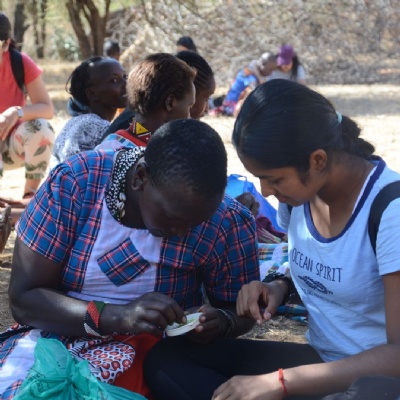By Aparajitha Anantharaman, Grade 10, UWC South East Asia, (East Campus)
UWC South East Asia’s Trip to DarajaKenya Transforms Preconceptions

The selection interview at Daraja
In a world where too many walls are being built, building a bridge, building a really strong bridge, is seminal. Daraja Academy (meaning ‘bridge’) is a secondary school in Kenya that provides education, opportunity and independence to girls who may otherwise not be able to attend school. Beyond academics, students are taught to produce their own food, think independently, and stand up strong. The school is equipped with everything the students need to pave their way into a bright future; it is a school of promise, a school built to create leaders, a school built for greatness. Most importantly, Daraja Academy teaches these dedicated young women that they are valued.
UWCSEA East has been working with Daraja as a Global Concern (GC) for four years now. In that short span of time, awareness of the gender empowerment-focused Daraja GC has grown from “What is Daraja?” to wide recognition of the group. Every Tuesday and Thursday at lunch we meet as a Middle and High School GC group to discuss any upcoming events, and how to tackle them. Being part of Daraja GC has really helped us to develop our resilience and leadership, as different members are encouraged to take the lead in new ways over time.
We are privileged to be able to visit Daraja Academy. Each year, after the eagerly anticipated service trip, students come back having learnt a great deal. Whether through time spent with the wonderful students at Daraja, going on a safari, or staying the night at the Twala village, this trip is truly an unforgettable experience. But most importantly, the service trip further strengthens our bond with the students at Daraja, helping us build meaningful connections. We’ve been transformed by gaining firsthand experience of the culture in Kenya and broadening our worldview thanks to insights from the Daraja girls.
During this year’s trip to Daraja Academy over the Lunar New Year holiday week, the East students were equally stretched through the very experience of being in Africa as well as getting a closer view of the selection process for students to attend Daraja. Following are two student accounts from those experiences.
She enters the room with a dignified stance, bows down her head, a gesture of respect, and says a quick hello to the panel of six administrators in the room. Eunice’s voice shakes slightly, as she introduces herself and sits down. “Tell us about yourself, who you are, what you do,” invites one of the senior staff members.
As she begins talking about her family and what they do for a living, I cannot believe what I am hearing. Her father is a pastoralist, meaning that the family keeps moving from place to place while tending to cattle and goats. As a result of the interruptions to her education, though she’s applying to join Form 1 (Grade 9), Eunice is already 18 years old.
“Nobody in my family has gone to school. Not even Class 1. We all just stay at home. In our culture, it is only correct for men to herd, and women to get married away, to collect water and firewood, look after the children; in the Masai culture, people think that educating a girl is a waste of money,” Eunice explains.
“Do you think education is important in Kenya?” asks another senior staff.
There is a moment of silence as Eunice gathers her thoughts, before bursting out. “Yes,” she says, “Because when you educate a girl, she will always go back to the community and help her people. I want to be a lawyer. I will go back to my community and help our women gain their rights.”
My respect for Eunice blossoms when she says this: her determination, her hope, are emboldening. Despite being a young Kenyan woman who has been told that educating her would be a waste of money, Eunice responds with altruism. She will use her education to empower her community.
